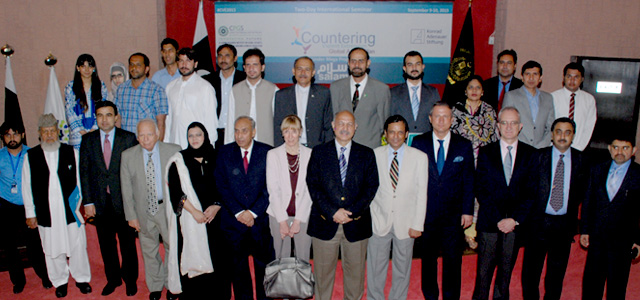 “The complex challenges of terrorism and violent extremism defy simplified solutions. The causes of terrorism and violent extremism are multiple and need a comprehensive response from the international community,” stated Senator Sehar Kamran (TI), President CPGS. She further recalled that Pakistan was one of the countries that had been hit hardest by the phenomenon, but has resiliently fought back to control its spread.
“The complex challenges of terrorism and violent extremism defy simplified solutions. The causes of terrorism and violent extremism are multiple and need a comprehensive response from the international community,” stated Senator Sehar Kamran (TI), President CPGS. She further recalled that Pakistan was one of the countries that had been hit hardest by the phenomenon, but has resiliently fought back to control its spread.
The remarks were made during her opening address at a Two-Day International Seminar on ‘Countering Violent Extremism: Global Action Plan’ was organized by the Centre for Pakistan and Gulf Studies (CPGS) in collaboration with German foundation Konrad Adenauer Stiftung on the 9th and 10th of September 2015 at the Pakistan Institute for Parliamentary Services (PIPS) Islamabad.
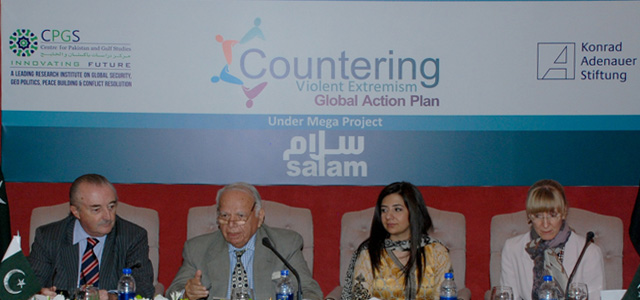 The seminar aimed at exploring the various possibilities for countries across the globe to work together and effectively combat the problem of violent extremism by building upon what has already been done within various countries unilaterally. It called for the resolution of longstanding international disputes and broader international cooperation to prevent the fanatic ideology from spreading
The seminar aimed at exploring the various possibilities for countries across the globe to work together and effectively combat the problem of violent extremism by building upon what has already been done within various countries unilaterally. It called for the resolution of longstanding international disputes and broader international cooperation to prevent the fanatic ideology from spreading
 The Two Day event was host to many eminent speakers, from all walks of life, including senior bureaucrats, diplomats, practitioners, distinguished members of the academia and civil society, as well as representatives from defense and governmental organizations. Keynote speakers for the event were Senator Mushahid Hussain Sayed, Chairman and founder of the Pakistan-China Institute and Lt Gen (R) Abdul Qadir Baloch, Federal Minister for States and Frontier Regions. Speakers for the event are as follows:-
The Two Day event was host to many eminent speakers, from all walks of life, including senior bureaucrats, diplomats, practitioners, distinguished members of the academia and civil society, as well as representatives from defense and governmental organizations. Keynote speakers for the event were Senator Mushahid Hussain Sayed, Chairman and founder of the Pakistan-China Institute and Lt Gen (R) Abdul Qadir Baloch, Federal Minister for States and Frontier Regions. Speakers for the event are as follows:-
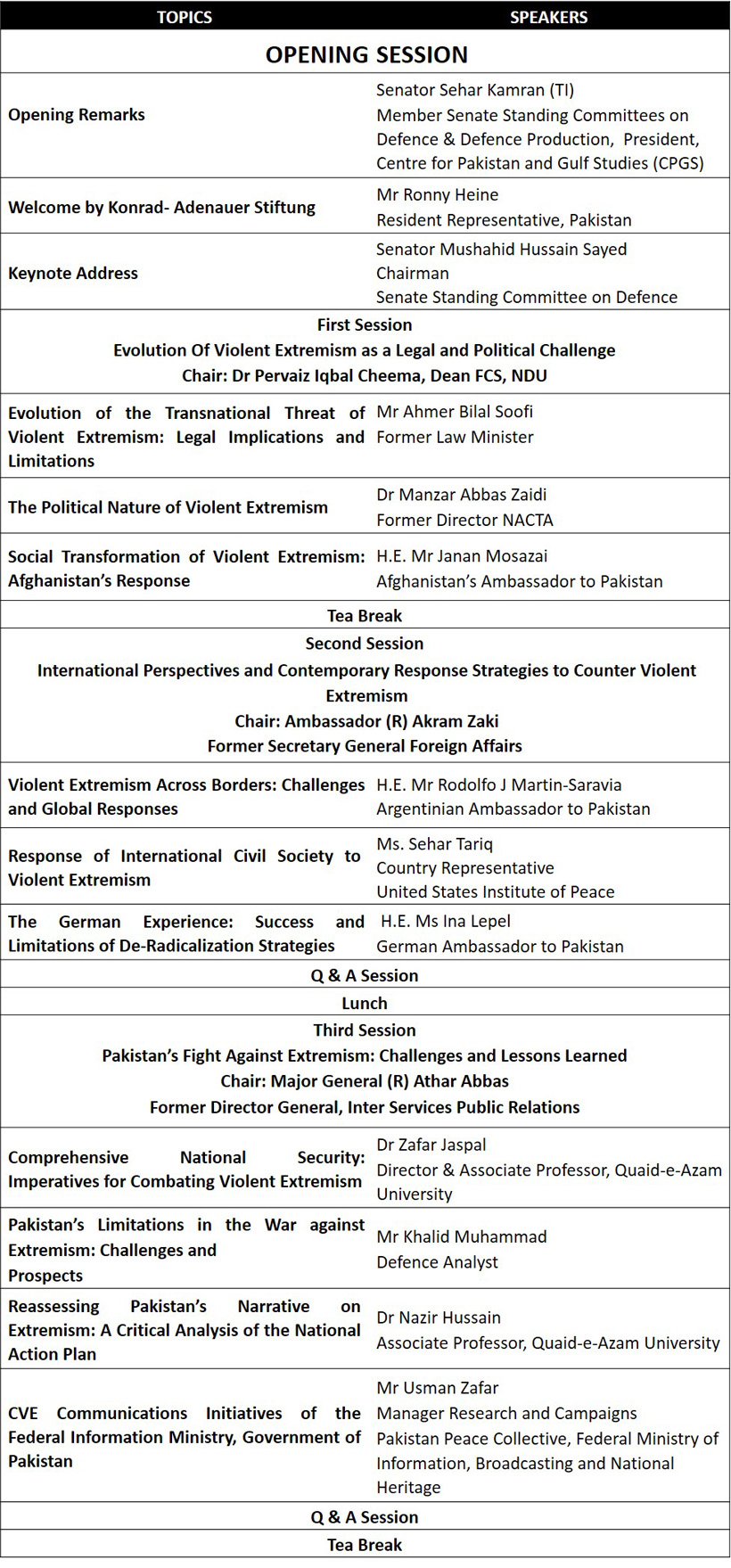
Programme of Day One (September 09, 2015)
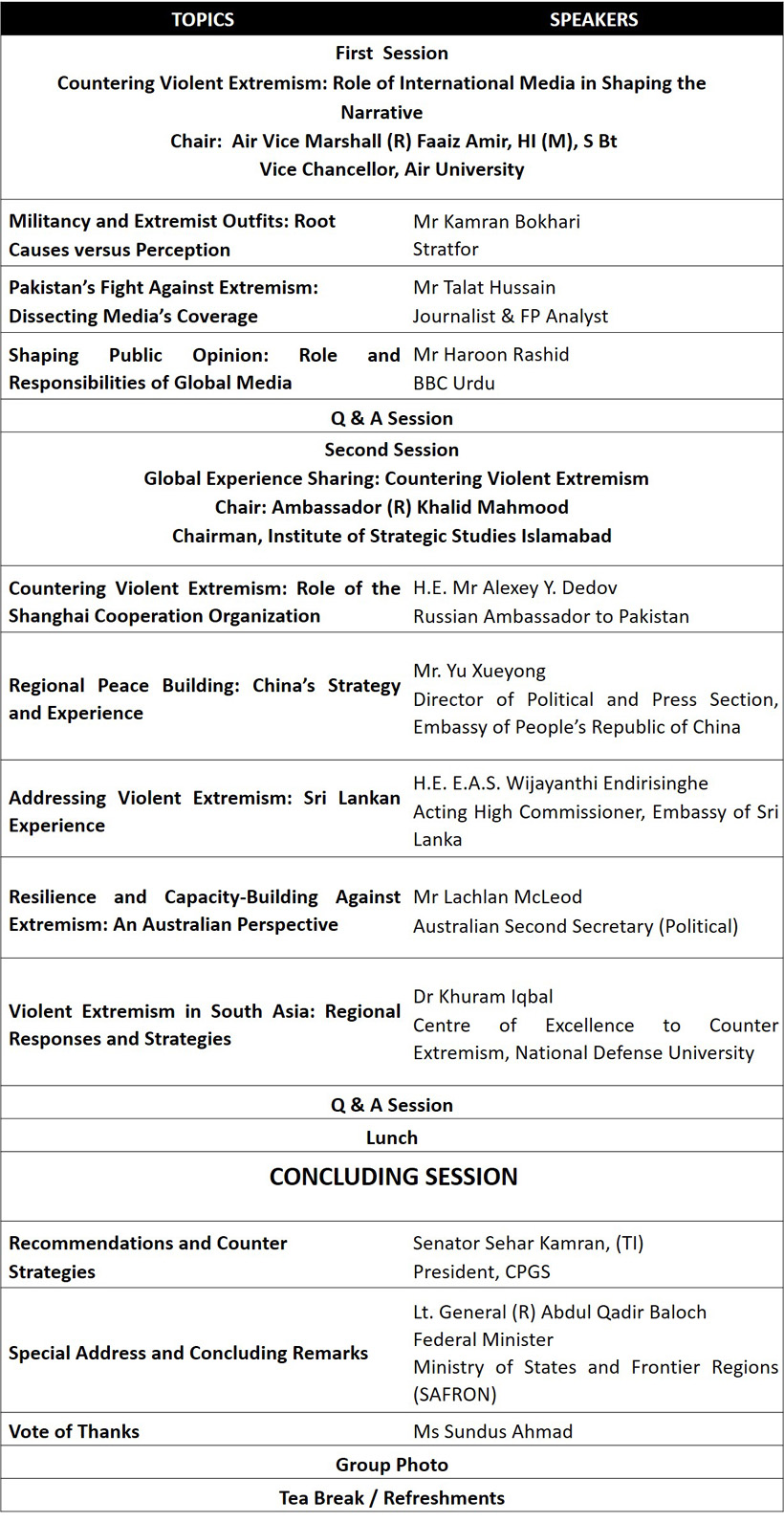
Programme of Day Two (September 10, 2015)
The Seminar culminated in the presentation of a series of Policy Recommendations by the Centre for Pakistan and Gulf Studies. The recommendations stressed upon the need for developing a framework mechanism with a consultative mandate by an appropriately representative platform such as the United Nations that could help member states develop their capacity to identify extremism and curb violent extremism at a local level. The document categorically rejects the identification of violent extremism with any one religion, sect, culture or region.
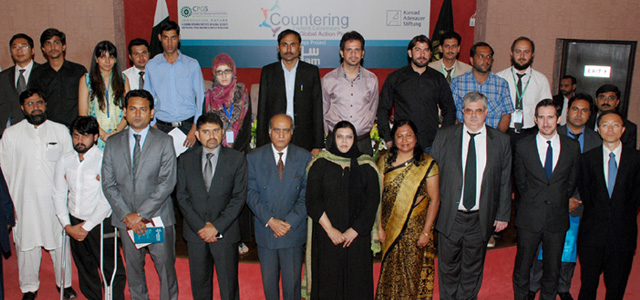 The recommendations further call for addressing the root causes of terrorism and extremism via multilateral, transnational efforts that involve encouraging the participation of local communities to develop values and norms of peaceful coexistence in truly pluralistic societies. The Centre urged that an environment conducive to such progress cannot be established unless policies based on ‘exclusion’ along racial lines and parochial prejudices are abandoned, and all-inclusive polices adopted.
The recommendations further call for addressing the root causes of terrorism and extremism via multilateral, transnational efforts that involve encouraging the participation of local communities to develop values and norms of peaceful coexistence in truly pluralistic societies. The Centre urged that an environment conducive to such progress cannot be established unless policies based on ‘exclusion’ along racial lines and parochial prejudices are abandoned, and all-inclusive polices adopted.
The Two Day Seminar was also attended by ambassadors, diplomats, academic scholars, senior media representatives, politicians, members of the academia, defense community, lawyers, university students as well as members of civil society.


